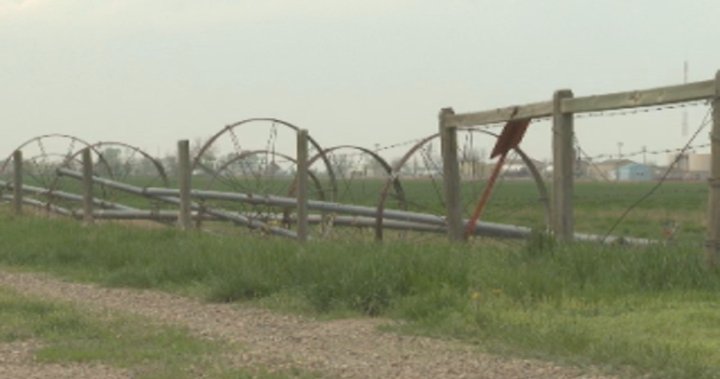Allison Davie of North Paddock Farms is cautiously optimistic about the upcoming irrigation season. She is pleased to see the water flowing, but acknowledges that there are still many uncertainties to contend with. Davie plans to make adjustments to their irrigation practices based on the amount of rainfall they receive throughout the season. The focus will be on high-value crops such as potatoes, with other crops being deprioritized to conserve water. David Westwood from Saint Mary River Irrigation District shares a similar sentiment, mentioning that it will be a challenging season ahead but remains hopeful that increased precipitation could benefit farmers.
The City of Lethbridge reports that the water storage levels in reservoirs are below normal, with the Old Man reservoir at 42 percent, St Mary at 49 percent, and Waterton at 23 percent. Typically, storage levels should be around 60 percent for all three reservoirs. Due to the lower water availability, North Paddock Farms has had to adjust their priorities and focus on high-value crops that require irrigation, such as potatoes, seed canola, and timothy hay. Davie emphasizes the importance of managing water resources effectively to ensure they last throughout the growing season, which runs until the end of September.
Despite the challenges presented by lower water levels, Davie is determined to navigate through the tough growing season ahead. She explains that there is a significant amount of planning and calculations involved in ensuring that there is enough water to sustain their crops until the end of September. The farm has made strategic decisions to maximize the available irrigation allocation for their highest priority crops while forgoing others that require more water. This approach requires careful management and monitoring of water usage throughout the season.
David Westwood suggests that if the region continues to receive significant precipitation into June, it could potentially alleviate some of the water shortage concerns for farmers. However, he emphasizes the need to closely monitor the snowpack melting and additional precipitation before considering any changes to water allocations. The uncertainty surrounding future precipitation levels adds to the complexity of managing irrigation resources effectively during the growing season. Both Davie and Westwood stress the importance of flexibility and adaptability in responding to changing water availability.
As the farming community braces for a challenging irrigation season, there is a shared sense of cautious optimism tempered by the realities of limited water resources. The need to prioritize high-value crops and manage water allocations efficiently underscores the importance of planning and adaptability in navigating through uncertain conditions. Despite the uncertainties, farmers like Allison Davie and David Westwood remain resilient and hopeful that favorable weather conditions and careful water management practices will help sustain agricultural production in the face of ongoing challenges. The collaborative efforts of farmers, irrigation districts, and local authorities will be crucial in ensuring the sustainability of agriculture in the region during the upcoming growing season.


